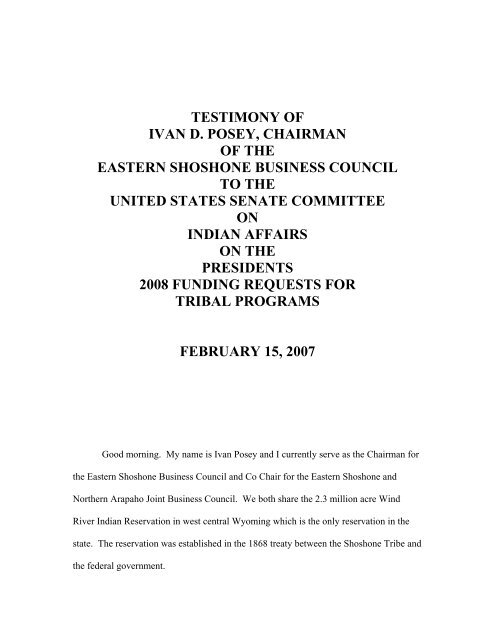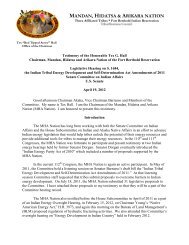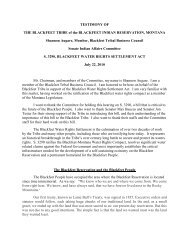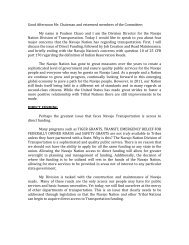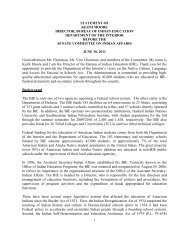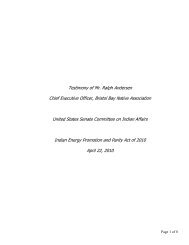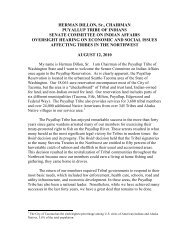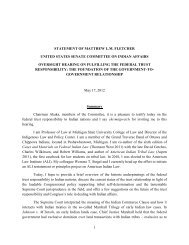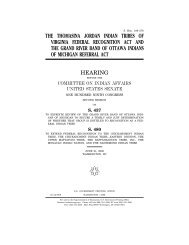testimony of ivan d. posey, chairman of the eastern shoshone
testimony of ivan d. posey, chairman of the eastern shoshone
testimony of ivan d. posey, chairman of the eastern shoshone
You also want an ePaper? Increase the reach of your titles
YUMPU automatically turns print PDFs into web optimized ePapers that Google loves.
TESTIMONY OF<br />
IVAN D. POSEY, CHAIRMAN<br />
OF THE<br />
EASTERN SHOSHONE BUSINESS COUNCIL<br />
TO THE<br />
UNITED STATES SENATE COMMITTEE<br />
ON<br />
INDIAN AFFAIRS<br />
ON THE<br />
PRESIDENTS<br />
2008 FUNDING REQUESTS FOR<br />
TRIBAL PROGRAMS<br />
FEBRUARY 15, 2007<br />
Good morning. My name is Ivan Posey and I currently serve as <strong>the</strong> Chairman for<br />
<strong>the</strong> Eastern Shoshone Business Council and Co Chair for <strong>the</strong> Eastern Shoshone and<br />
Nor<strong>the</strong>rn Arapaho Joint Business Council. We both share <strong>the</strong> 2.3 million acre Wind<br />
River Indian Reservation in west central Wyoming which is <strong>the</strong> only reservation in <strong>the</strong><br />
state. The reservation was established in <strong>the</strong> 1868 treaty between <strong>the</strong> Shoshone Tribe and<br />
<strong>the</strong> federal government.
There are currently 3900 Eastern Shoshone and 8200 Nor<strong>the</strong>rn Arapaho tribal<br />
members. Over 50% <strong>of</strong> tribal members from both tribes are under <strong>the</strong> age <strong>of</strong> 30. The<br />
reservation is home to approximately 7000 American Indians and 9000 non-Indians.<br />
First <strong>of</strong> all I would to thank <strong>the</strong> distinguished Senators on <strong>the</strong> committee,<br />
including our own Senator Craig Thomas, for allowing me to testify on funding issues<br />
related to <strong>the</strong> Presidents 2008 federal budget.<br />
Let me start my <strong>testimony</strong> with a statement regarding <strong>the</strong> Presidents Budget for<br />
Tribal Programs in this manner. I have served <strong>the</strong> Eastern Shoshone Tribe for 11 years<br />
and throughout that time have had <strong>the</strong> opportunity to travel to our Nations Capitol to<br />
address <strong>the</strong> needs <strong>of</strong> tribal citizens and to share our positive contributions to our great<br />
country. It has become more challenging over <strong>the</strong> years to receive <strong>the</strong> funding needed to<br />
adequately address tribal needs.<br />
The Presidents FY 2008 Budget remains in <strong>the</strong> same mold with cuts to Indian education,<br />
health care, and o<strong>the</strong>r tribal programs drastically while completely eliminating o<strong>the</strong>r vital<br />
funding.<br />
For example, <strong>the</strong> Johnson O’Malley program which many tribes utilize for language and<br />
traditional revitalization has been completely eliminated from <strong>the</strong> budget. This would<br />
affect our school systems and Head Start programs that rely on this funding to assist
tribal efforts to continue educating our youth <strong>of</strong> <strong>the</strong>ir heritage. With <strong>the</strong> passing <strong>of</strong> many<br />
<strong>of</strong> our elders this process becomes <strong>of</strong> more importance to our tribal communities. Cuts to<br />
o<strong>the</strong>r education matters such as construction, and grant assistance need to be increased as<br />
well as <strong>the</strong> need to increase funding for tribal colleges which are all vital to <strong>the</strong> citizens <strong>of</strong><br />
Tribal Nations.<br />
Cuts to out tribal court systems would drastically affect <strong>the</strong> administration <strong>of</strong> justice in<br />
Indian Country which in some cases is already under funded. The tribal court system<br />
serves as <strong>the</strong> backbone <strong>of</strong> our sovereignty and needs adequate funding. Without a strong<br />
and reputable tribal court system tribes will face <strong>the</strong> scrutiny and criticism from Indians<br />
and non Indians alike on <strong>the</strong> credibility <strong>of</strong> our administration <strong>of</strong> tribal laws and codes.<br />
With <strong>the</strong> gains made in Indian Country to establish and manage tribal courts we cannot<br />
afford to continue to make progress in this very important area.<br />
Law Enforcement remains a top priority in terms <strong>of</strong> public safety for Indian Country. On<br />
<strong>the</strong> Wind River Indian Reservation we currently have 10 <strong>of</strong>ficers to patrol roughly 3500<br />
square miles. We need more uniformed patrolman to continue to provide safety to our<br />
communities and address <strong>the</strong> problems <strong>of</strong> substance and drug abuse. Additional funding<br />
is also needed for tribal Fish and Game programs which oversee our natural resources<br />
and provides assistance to our law enforcement agencies when needed. Currently <strong>the</strong><br />
Eastern Shoshone Tribe employs five fish and game <strong>of</strong>ficers which are funded directly<br />
from tribal funds.
The need for adequate housing in Indian Country continues to grow. Although <strong>the</strong>re has<br />
been progress in Indian Country in addressing this matter over <strong>the</strong> past years we still have<br />
a ways to go. Through tax credits and utilization <strong>of</strong> <strong>the</strong> 184 program some needs are<br />
being met on and <strong>of</strong>f reservations but <strong>the</strong> need continues with <strong>the</strong> growth <strong>of</strong> young<br />
families and <strong>the</strong> need to sometimes restore and rebuild aging infrastructure. The<br />
elimination <strong>of</strong> <strong>the</strong> Housing Improvement Program in <strong>the</strong> Presidents budget would be very<br />
harmful to tribes who utilize <strong>the</strong> funding to renovate elderly and handicapped homes and<br />
at times provide homes to tribal people in need.<br />
There are many issues in <strong>the</strong> area <strong>of</strong> health care that I would like to address. Regarding<br />
<strong>the</strong> need for additional funding for Indian Health Service <strong>the</strong>re are three areas that are <strong>of</strong><br />
importance to tribal citizens. The first is <strong>the</strong> need for additional funding for contract<br />
health services. Contract Health Services allows for immediate care for those in medical<br />
crisis. Over <strong>the</strong> past 10 years <strong>the</strong>se costs have not kept up with rate <strong>of</strong> inflation and have<br />
basically remained flat budgets. Tribal governments such as ours on <strong>the</strong> Wind River<br />
Reservation are currently covering costs associated with <strong>the</strong> inadequate funding <strong>the</strong><br />
Indian Health Service currently receives. To receive contract health services a person<br />
needs to be in a life or death situation. For example, a person may be in a car accident<br />
due to substance abuse and receives injuries which threaten <strong>the</strong>ir life. This one car<br />
accident in itself may cost <strong>the</strong> local service unit $400,000.00 out <strong>of</strong> a $1.3 Million dollar<br />
budget. In <strong>the</strong> meantime a person needing a knee replacement for several years will be<br />
denied services. Many emergency room visits are not paid by <strong>the</strong> Indian Health Service<br />
which eventually falls on <strong>the</strong> patient who may not have <strong>the</strong> means to pay and is soon
turned into collection agencies. This has affected many tribal members who may wish to<br />
finance a home through o<strong>the</strong>r federal programs such as <strong>the</strong> 184 program <strong>of</strong>fered through<br />
Housing <strong>of</strong> Urban Development.<br />
Substance abuse and diabetes continue to rise in Indian Country. Methamphetamine use<br />
has a tremendous negative affect on our community and resources are needed on <strong>the</strong> law<br />
enforcement, prevention, and treatment areas to address this devastating drug. Innovative<br />
programming that deals with family intervention and after care support are critical to <strong>the</strong><br />
recovery and well being <strong>of</strong> individuals who seek help. Access to treatment in Indian<br />
Country is also a barrier at times when family involvement is needed. Regional<br />
Treatment Centers are needed across <strong>the</strong> country that will assist tribes to provide <strong>the</strong>ir<br />
citizen’s with better access and support.<br />
Diabetes is an area in which many tribal people are affected. Many young people are<br />
now being diagnosed with this disease that used to mostly affect adults. Funding to<br />
Indian Country over <strong>the</strong> past years have allowed tribes like ours to develop tribal gyms<br />
and to promote healthy eating and exercise in our communities. Although <strong>the</strong>re<br />
continues to be a rise in diabetes I feel funding to tribes has helped curb some <strong>of</strong> <strong>the</strong>se<br />
numbers for <strong>the</strong> better.<br />
With <strong>the</strong> continued cuts to health care in Indian Country I would ask members <strong>of</strong><br />
congress, from both parties and independents, to continue to address <strong>the</strong> reform <strong>of</strong> <strong>the</strong><br />
health care system in this country. The rising costs <strong>of</strong> pharmaceuticals and <strong>the</strong> lack <strong>of</strong>
access to health care in many communities has placed this country in a crisis mode. For<br />
Tribal Nations to continue to look after <strong>the</strong> needs <strong>of</strong> it’s citizens health care I firmly<br />
believe <strong>the</strong>se issues need to be addressed. Corporate greed continues to have priority<br />
over <strong>the</strong> well being <strong>of</strong> our nation’s citizens. Tribal Governments, as well as states, are<br />
subject to this health care crisis.<br />
I would also ask <strong>the</strong> members <strong>of</strong> Congress to carefully evaluate <strong>the</strong> War in Iraq. With<br />
military spending up and a record deficit, <strong>the</strong> President’s budget cuts domestic spending.<br />
Being an Army Veteran I understand <strong>the</strong> importance <strong>of</strong> serving our great country and <strong>the</strong><br />
responsibility <strong>of</strong> safeguarding our people. Tribal people have and continue to serve in<br />
our Armed Forces at a rate higher than any o<strong>the</strong>r group in <strong>the</strong> United States. We have<br />
always answered <strong>the</strong> call. The cuts to <strong>the</strong> Veterans Administration are <strong>of</strong> concern to our<br />
tribal communities as well. As many veterans return from service many need additional<br />
help. We would like our returning veterans to receive <strong>the</strong> care and respect <strong>the</strong>y deserve.<br />
In closing, I would like to thank <strong>the</strong> committee on listening to my concerns as an elected<br />
<strong>of</strong>ficial <strong>of</strong> my tribe. I am encouraged that many members <strong>of</strong> congress acknowledge and<br />
respect <strong>the</strong> trust responsibility from <strong>the</strong> United States Government to Indian Tribes. As<br />
we continue to defend our treaties and executive orders we will also continue to defend<br />
this great country <strong>of</strong> ours.<br />
Who Wee Who (Thank You) and God Bless


